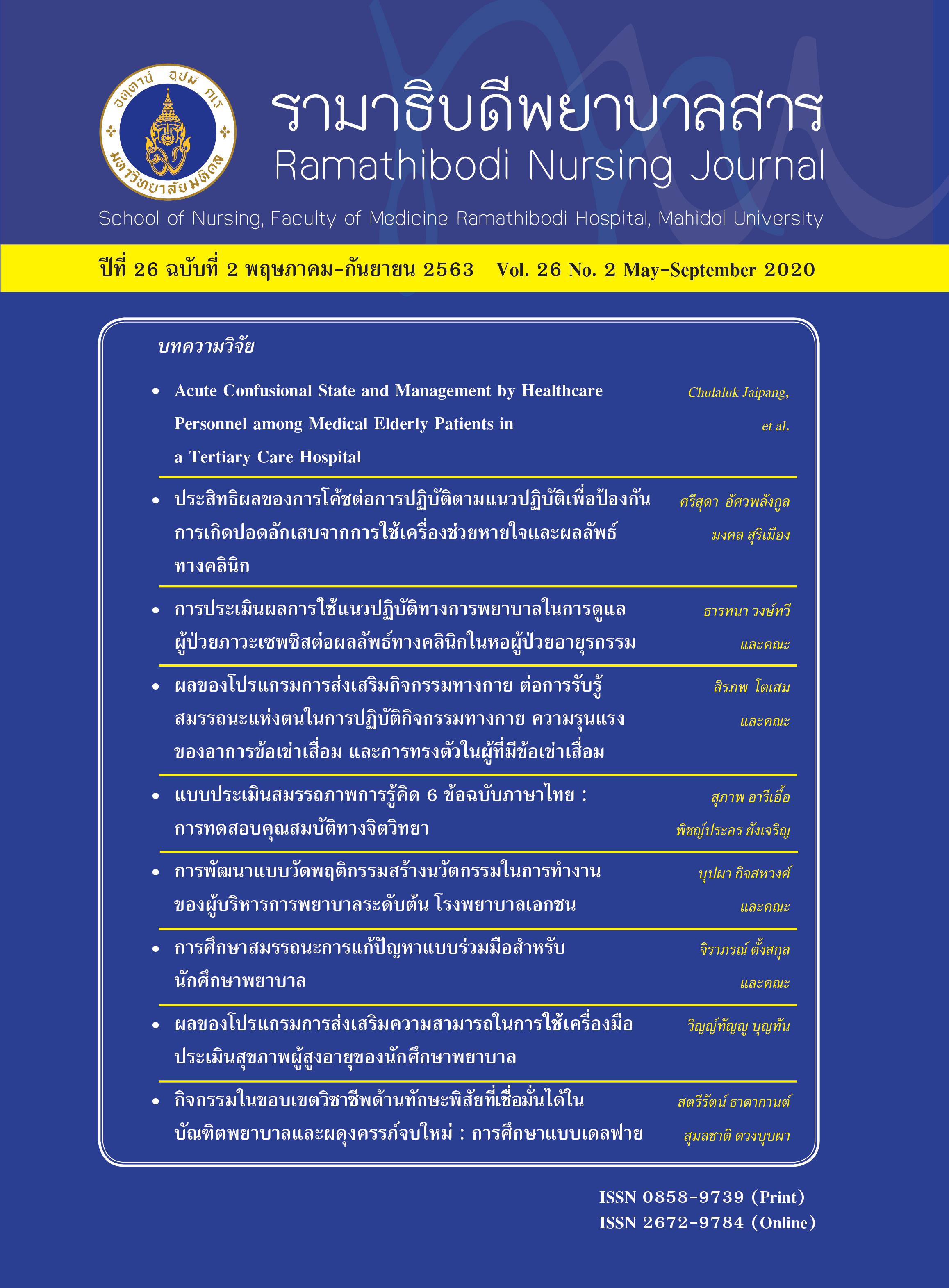The Effect of a Competency-Strengthening Program to Use Geriatric Health Assessment Tools among Nursing Students
Main Article Content
Abstract
This quasi-experimental study aimed to examine the effects of a competencystrengthening program to use geriatric health assessment tools on knowledge and perceived skills in using the tools of nursing students. The concept of experiential learning was used to guide the study. The sample consisted of 48 third-year nursing students by which 24 students were in the experimental group and 24 students were in the control group.Research instruments included: 1) the Knowledge to Use Geriatric Health Assessment Tools Scale), and 2) the Perceived Skills to Use Geriatric Health Assessment Tools Scale. Data were analyzed using descriptive statistics, Wilcoxon signed-rank test, and Mann-Whitney U test. The results showed that the mean rank of knowledge and perceived skills in using geriatric health assessment tools after the experiment were significantly higher than those before the experiment, as well as higher than those in the control group.
Therefore, the competency-strengthening program to use geriatric health assessment tools should be applied to nursing students before practicing in nursing practicum.
Article Details
บทความ ข้อมูล เนื้อหา รูปภาพ ฯลฯ ที่ได้รับการตีพิมพ์ในรามาธิบดีพยาบาลสาร ถือเป็นลิขสิทธิ์ของวารสาร หากบุคคลหรือหน่วยงานใดต้องการนำทั้งหมดหรือส่วนหนึ่งส่วนใดไปเผยแพร่หรือเพื่อกระทำการใด ใด จะต้องได้รับอนุญาตเป็นลายลักษณ์อักษรจากรามาธิบดีพยาบาลสารก่อนเท่านั้น
References
National Board of the Elderly, Ministry of Social Development and Human Security. The 2nd National Plan
on the Elderly Plan 2002-2021. Bangkok: Teppenwanich;2010. (in Thai)
Ministry of Social Development and Human Security.Thailand aging population: current and future. Bangkok:
Information and Communication Technology Center,Ministry of Social Development and Human Security;
(in Thai)
Foundation of Thai Gerontology Research and Development Institute. Situation of the Thai elderly 2017. Bangkok:Duan Tula press; 2018. (in Thai)
World Health Organization. World report on ageing and health, 2015 [cited 2018 December 10]. Available from
World Health Organization Website: http://www.who.int/about/licensing/copyright_form/en/index.htm
Touhy TA, Jett KF. Ebersole & Hess’ gerontological nursing & healthy aging. 5th ed. St. Louis, Missouri:
Elsevier; 2018.
Department of Medical Services, Ministry of Public Health.Older adults’ screening-assessment manual. 2nd ed.
Bangkok: The War Veterans Organization of Thailand Press; 2015. (in Thai)
Hirst SD, Lane AM, Miller CA. Miller’s nursing for wellness in older adults. Philadelphia: Wolters Kluwer/
Lippincott Williams & Wilkins; 2015.
Thongjareon V. Science and art in gerontological nursing.2nd ed. Bangkok: NP Press; 2015. (in Thai)
Thaniwattananon P. Care towards best nursing practice in geriatric syndromes. Songkhla: Faculty of Nursing, Prince of Songkhla University; 2016. (in Thai)
Huachiew Chalermprakiet University. Study academic guide 2017. Nonthaburi: SR Printing Mass Product;
Bunthan W, Yukunthorn S, Phonngor A, Rukkito A,Phonsuk P, Todoung S, et al. Survey report on the
experience of using the older adults’ health assessment tools of the 4th year students, Faculty of nursing Huachiew Chalermprakiet University. Samutprakarn: Faculty of Nursing, Huachiew Chalermprakiet University; 2018. (in Thai)
Kolb DA. Experiential learning: experience as the source of learning and development. Englewood Cliffs, NJ:
Prentice Hall; 1984.
Norkaeo D. Simulation based learning for nursing education. Journal of Boromarajonani College of Nursing,
Bangkok. 2015;31(3):112-22. (in Thai)
Suapumee N, Naksrisang W, Singhasem P. Management of experiential learning in nursing education. Nursing Journal of the Ministry of Public Health. 2017;27(1):12-21. (in Thai)
Suwanjaroen J, Sarakshetrin A, Malai C. Teaching models to enhance the 21st century skills for bachelor’s degree nursing students. Nursing Journal. 2017;44(4):177-88.(in Thai)
Fraenkel JR, Wallen NE, Hyun HH. How to design and evaluate research in education. 9th ed. New York:
McGraw-Hill Humanities/Social Sciences/Languages;2014.
Wongrattana C, Naiyapatana O. Experimental research design and statistics: basic concepts and methods.
Bangkok: Chula Press; 2008. (in Thai)
Vorapongsathom T, Vorapongsathom S. Sample size calculations for research by using G*Power software
package. Thailand Journal of Health Promotion and Environmental Health. 2018;41(2):11-22. (in Thai)
Karuncharernpanit S, Seesanea S. Development of nursing students’ competency enhancing program regards comprehensive geriatric assessment using experiential learning. Nursing Journal of Ministry of Public Health. 2017;27(2):168-80. (in Thai)
Kimsungnoen N, Petchtang S, Yantaporn C. Learning style and academic achievement of undergraduate nursing students of Rangsit university. Journal of Association of Private Higher Education Institutions of Thailand under the Patronage of Her Royal Highness Princess Maha Chakri Sirindhorn. 2018;24(1):5-14. (in Thai)
Arayathanitkul B, Sawekngam W, Chuchat A. (2560).Development of an instructional model based on character education and experiential learning approaches for enhancing cultural competences in nursing of nursing students. Journal of Royal Thai Army Nurses. 2017;18(3):51-61.
Sinthuchai S, Ubolwan K, Boonsin S. (2560). Effects of high-fidelity simulation based learning on knowledge,
satisfaction, and self-confidence among the fourth year nursing students in comprehensive nursing care practicum.Rama Nurs J. 2017;23(1):113-27. (in Thai)
Rakthai D, Cheepprosop N, Ponsang S. Media literacy skills development among nursing students: the effects of an experiential learning program on health promotion and illness prevention practicum. Southern College Network Journal of Nursing and Public Health. 2017;4(2):63-76.(in Thai)
Sansri N, Lertwatthanawilat W, Unahalekhaka A. Effect of experiential learning on efficiency of targeted hospital associated infection surveillance among infection control ward nurses. Nursing Journal. 2015;42(4):36-47. (inThai)


